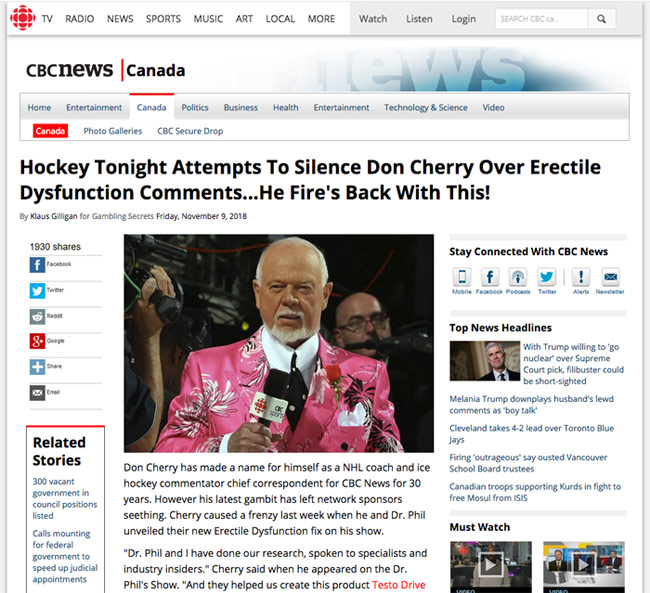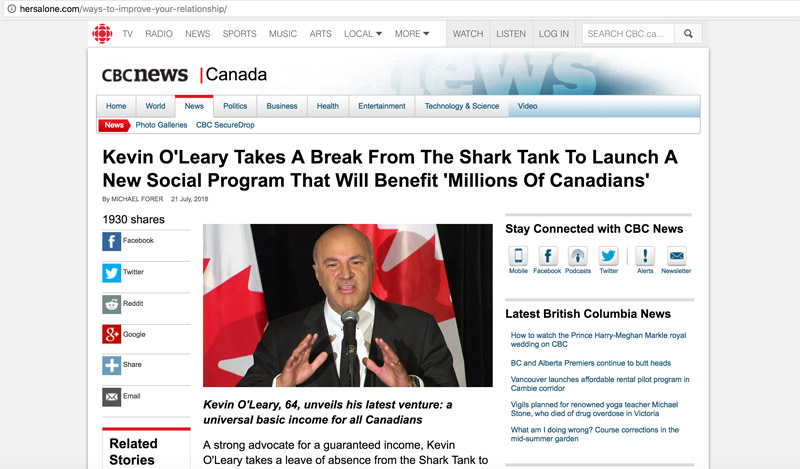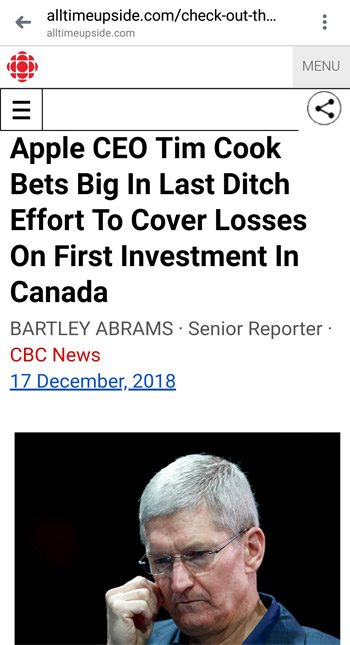
Did you see the recent CBC story about Don Cherry endorsing a new erectile dysfunction drug in partnership with Dr. Phil? How about the news Wendy Mesley left the public broadcaster after 32 years to focus on her skincare business? Or did you see the CBC report on how Kevin O’Leary, in a change of heart akin to Ebenezer Scrooge, is starting his own investment fund to help give Canadians a basic income via an online casino?
None of these stories are true, of course, but they have been floating around the internet for at least the past several months, including on Facebook, Twitter, and even major news websites, where they appear as paid promoted content and advertisements.
A CANADALAND investigation into this Canadian-fake-news phenomenon has found it to be a common occurrence, with many Canadian media celebrities featured as subjects of phony stories in order to sell products, with other scammers outright stealing the CBC’s website layout to try to dupe readers into believing they’re reading an authentic CBC article.
We look at:
• How fake-news scams mimicking the CBC website spread on Facebook
• The fake phenomenon of female TV hosts leaving their jobs to start skincare lines
• Why legitimate news sites showcase links to fake-news scams

Back in mid-July, I came across a promoted article on Facebook titled “Kevin O’Leary Takes A Break From The Shark Tank To Launch A New Social Program That Will Benefit ‘Millions of Canadians.’” The phony story was published by a website called alltimeupside.com that ripped off a variation of the CBC’s site layout, masquerading as a legitimate article written by a fictitious senior reporter named Michael Forer. In the fake article, the pseudo CBC journalist tells readers the former Dragons’ Den star is contributing billions of dollars to a basic income fund that is partnered with an online casino. The online casino is promoted throughout the article. At the bottom, there are fake Facebook comments offering testimonials of the supposedly generous casino giving major payouts. The date on the article automatically changes to the current day’s date.
Upon further investigation, it turns out lots of Canadians were seeing fake articles promoted by Facebook groups on their timeline back in July.


A couple days later, Conservative MP Cheryl Gallant published a post on her website warning her constituents of similar fake CBC stories circulating online using “just enough snippets of real news to fool unsuspecting Canadians.” Other Facebook users also commented about seeing similar bogus articles on their news feeds.
https://www.facebook.com/photo.php?fbid=10160743288120525&set=a.10151994686290525&type=3&theater
This summertime littering of fake CBC articles on Facebook was just another wave in an ocean gyre of garbage online content that gets regularly promoted on the social media platform. Back in May of last year, Inuk throat singer, visual artist, and writer Tanya Tagaq was depicted and exploited in a fake CBC article in which the fraudsters claimed she was investing in and endorsing a sketchy cryptocurrency:
WARNING: There's a fake news piece that resembles a @CBCNews story about @tagaq + cryptocurrencies/bitcoin invsmt on Facebook, it is 100% false/fraudulent & risky to click/ share this link. DON'T CLICK! We're working to have it removed. PLS report the post as scam if you see it! pic.twitter.com/pblHb0nvel
— tanya tagaq (@tagaq) May 24, 2018
In September, Facebook directed an estimated 86,000 visitors — according to SEO-measuring software SimilarWeb — to themonthlyteam.com, a website that appears to have published another bogus O’Leary article that was promoted on Facebook that same month.
It’s unclear what portion of The Monthly Team’s visitors were baited by fake articles, because the original story no longer exists and it’s hard to tell how many such pages the domain hosted. Furthermore, there are no other traces of the site’s content showing up in Facebook’s search results, suggesting the posts from September have been scrubbed or are not searchable. What’s left on The Monthly Team website are just five bland articles that appear to have no Facebook engagement, according to social-media-engagement measuring software CrowdTangle.
I was able to turn up a July-dated Facebook post that appeared to have linked to the O’Leary hoax I saw at the time — but the URL now redirects to a similar bogus CBC article carrying the current date, in which Apple CEO Tim Cook is now the one investing in an online casino for Canadians:

“More advanced scams are context-aware, meaning [depending on] the browser you are using, your computer setup, and where you are coming from, it will actually show you different content,” says BuzzFeed News editor and fake-news expert Craig Silverman.
While researching a story, Silverman gained access to the directories of some of these sites and discovered “that they had basically created literally hundreds of different versions with different types of offers, different types of celebrities, and the combination of those two just being switched out in hundreds of combinations.” He says the scammers test these combinations on various ad networks to see which ones work best and then put money behind the most successful ones.
Earlier iterations of CBC scam articles date as far back as 2012, although it’s unclear when they started targeting users on Facebook and Tumblr, where they have also become common. The fraudsters behind these websites are typically good at covering their tracks, registering dozens upon dozens of websites anonymously. A more recent version of the scam was reported by blogger Giulia Forsythe at the end of October.
A spokesperson for Gallant, the MP for Renfrew–Nipissing–Pembroke, says she decided to issue the warning about these sites after being contacted by a concerned constituent. “With the problem of fake news, and in this case the CBC connection, MP Gallant felt that attention needed to be [paid] to what she perceived would become a growing problem,” Malcolm Montgomery says.
Neither Facebook nor the Canadian Anti-Fraud Centre, the agency responsible for monitoring mass marketing frauds, responded to requests for comment for this story.

When asked if the government had been in talks with Facebook over fake-news scam articles popping up on its platform, Simon Ross, the press secretary for Heritage Minister Pablo Rodriguez, raises the issue of disinformation more generally. “Across the world, we see disinformation and the press being politicized,” he says. “Governments must take action.”
“Social media platforms need to do more to protect our democracy, recognize their responsibility, and review their current practices. That’s why we are reviewing the Broadcasting Act so that all players contribute to our system, including to quality journalism.”
Since taking office, the government of Prime Minister Justin Trudeau has had a close relationship with Facebook, although the Toronto Star reported at the start of last year that Trudeau had given Facebook chief operating officer Sheryl Sandberg an ultimatum to crack down on fake news or else face government regulations.
Agence France-Presse (AFP) journalist Louis Baudoin-Laarman, Facebook’s sole contracted fact-checker designated to vet fake news stories in Canada, says he’s come across some of these scam posts on occasion but hasn’t “looked into it enough to determine whether they are coming from a concerted effort from a single source or whether this is a more diffuse effort.”
He says he doesn’t recall notifying Facebook about any, because none of the handful he’s encountered have met the 1,000-share threshold to warrant a full debunk.
“Part of the problem is that most of the monitoring I do depends on content that Facebook users flag, so if no one reports fake content to them, it’s not as likely I’ll debunk it, because there is so much false content out there that I might find first,” he says. “We’re trying to get people to notify myself or the AFP about Canadian-centric false content they see, but it’s not yet that efficient.”


The CBC, for its part, is trying to find other solutions.
“Beyond working with Facebook and Twitter to identify and remove posts that contain false information about CBC, we are monitoring this trend closely, following up on all of these stories, often with a legal letter,” public affairs head Chuck Thompson says in an email. “In light of the increase we’ve seen with disinformation, we are looking at other technological ways of dealing with these stories going forward.”
Other than an early 2017 blog post warning about Facebook ads with fake Dragons’ Den endorsements, the CBC hasn’t appeared to report on its site the issue of fraudsters appropriating its brand.
@CBCCanada is this a real CBC story? >>Kevin O'Leary Being Sued After Using Illegal Information To Make Millions
By MICHAEL FORER 18 March, 2018< https://t.co/rP2mgGk07M— Brian A. Kilgore (@BrianAKilgore) March 18, 2018
As for why CBC is the primary Canadian news outlet spoofed by scammers, BuzzFeed’s Silverman theorizes that, “Even with something like CTV, which is well-known across the country, they’re not as present in as many local communities as CBC is. So it makes sense to use the public broadcaster, the one that is everywhere and is universally known.”
CBC still continues to promote Facebook by asking its audiences to like and watch their programs on the platform. Tech columnist Jesse Hirsh was admonished in November for questioning CBC’s relationship with Facebook while live on Toronto’s Metro Morning; a CBC editor’s note falsely claimed he called for a boycott of Facebook. Hirsh hasn’t been invited back on the program since.
Another common phony narrative advertised on social media and other popular news websites is that of a female celebrity leaving her TV-network post to focus full-time on her skincare business. Instead of these articles ripping off the CBC’s website layout, they mimic legitimate infotainment websites. In recent months, the targeted Canadian personalities have been CBC The Weekly host Wendy Mesley and CTV chief news anchor Lisa LaFlamme, on which CTV did a brief report.
Always happy to be associated with @LisaLaFlammeCTV but not for selling a scam. I never endorse a product. Don't get stung! Am no longer hosting @CBCTheNational but am very happy at #CBCTheWeekly Sundays at 11 a.m.
— Wendy Mesley (@wendy_mesley) November 21, 2018
Concerns have been created by fabricated reports associated with a misleading social media advertising campaign targeting Canadian media personalities, including @WendyMesleyCBC. These reports are false. Wendy is still the host of The Weekly and remains a vital part of @CBCNews
— Jennifer McGuire (@JenMcGuire_Cdn) December 5, 2018
Thank you for reporting it. This scam is an attempt to get your credit card information and steal your money. Hard to understand why @facebook still has no mechanism to shut this fraud down on their own platform. #fail #fixit https://t.co/24yvI4qAem
— Lisa LaFlamme (@LisaLaFlamme_) November 24, 2018
“It appeared in my feed repeatedly for weeks. I’m fairly sure at least daily,” Amanda Galbraith, a principal at public strategies and communications firm Navigator, says about the fake news of Mesley’s departure. “I would regularly report it to Twitter, but it would reappear regardless, which is why I tweeted about it to draw further attention.”
https://twitter.com/agalbraith/status/1068221298789285894
The “Mattie Curtis” Twitter account that advertised the fraudulent article on at least one occasion remains an active user.
“I did not click on it because I was concerned about the website. But I did check to see why I was being targeted. I was told it was targeting females over 35 in Toronto.” Galbraith also says the bogus story was promoted by a different Twitter account each time she saw it.
“We’ve made big gains in 2018 in terms of how we respond to user reports,” Twitter Canada’s head of communications, Cameron Gordon (no relation to the author), said via email late last year. “That said, we have more work to do in these areas as we improve the Twitter experience for all users.”
Before Mesley and LaFlamme, CTV’s Marilyn Denis was a subject of the phony articles back in September, leading her to make a statement to clarify she was not leaving her eponymous show:
Attn: Fans and viewers of The Marilyn Denis Show pic.twitter.com/WR9nAWdmJ5
— The Marilyn Denis Show (@TheMarilynShow) July 31, 2018
A CBC Marketplace investigation from October 2017 looked at the online skincare scam, but didn’t focus on Facebook, Twitter, and other popular websites allowing these bogus articles to be promoted on their platforms.
Silverman explains that these sites entice consumers to purchase small samples but in fact sign them up for monthly subscriptions. “And so unless you read the extremely fine print, you are not paying four dollars or five dollars for a free sample, you’re actually going to get billed 70, 80, 100 dollars within a week or two of signing up for this. And it’s going to keep hitting your card until you call and cancel,” he says.
The scammers behind the fake news websites don’t just target social media. Ad networks that supply prominent websites with advertisements are another major conduit for fraudsters to lay bait.
Heads up, @CNNPR, your paid content is linking to a site masquerading as @CBCNews. It completely steals our (old) website design and uses a fake CBC staffer's name to promote some BS online casino. (Also uses @TD_Canada online banking screenshot.) pic.twitter.com/SunJhqOERJ
— Robson Fletcher (@CBCFletch) July 9, 2018
Days after CTV had reported on the skincare scam, MSN News was still advertising the phony story about LaFlamme retiring from her anchor job to focus on selling skincare products. Major ad network Taboola was the one supplying the phony story to the MSN News website.

“The integrity of our network, from fake news to quality of information we recommend in general is something we take very seriously as a company, and me personally as well,” writes Taboola founder and CEO Adam Singolda in an email. He also says Taboola has a “human team that is now manually reviewing about a million URLs every month.”
Singolda had another Taboola employee reach out to me to request to see the bogus Lisa LaFlamme story promoted by their services and said that it was promptly disabled “pending further investigation by our content review team.”
A Wired UK report from 2017 found that Taboola and Outbrain (the other biggest supplier of promoted content to popular websites) were serving misleading and fake stories to many of the 1.5 billion people that see their clients’ ads monthly, because those items were more successful at getting clicks than more legitimate content.
The more people that click the ads, the more outlets get paid by these networks, leading to venerable newspapers such as The Washington Post allowing ad networks to supply fake and misleading news stories to be promoted on their websites.
Last April, a CANADALAND reader sent screenshots of a phony CNN story entitled “Trudeau Legalizes Online Casinos To Cover Losses” that he saw promoted on The Washington Post’s website:

“Whether it’s ad networks or Facebook or Twitter — everybody has proven really bad at being able to get these [scams] down quickly and to stop them,” says Silverman. “And the reality is, people keep running these scammy ads with fake celebrity endorsements because they work, people click on them, and then people will actually sign up for the product. They only make money when people sign up for the product.”
It’s all a scam ! I don’t endorse products and am still with CBC! so sorry you got trapped https://t.co/ltV2PqC1uR
— Wendy Mesley (@wendy_mesley) January 3, 2019
